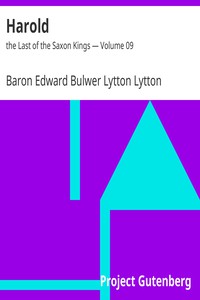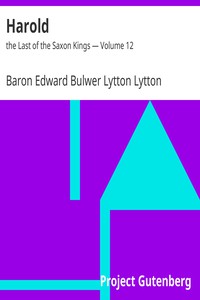Harold : the Last of the Saxon Kings — Complete, Lytton [best e reader for academics .txt] 📗

- Author: Lytton
Book online «Harold : the Last of the Saxon Kings — Complete, Lytton [best e reader for academics .txt] 📗». Author Lytton
CHAPTER II.
At dawn, Harold woke from uneasy and broken slumbers, and his eyes fell upon the face of Hilda, large, and fair, and unutterably calm, as the face of Egyptian sphinx.
“Have thy dreams been prophetic, son of Godwin?” said the Vala.
“Our Lord forfend,” replied the Earl, with unusual devoutness.
“Tell them, and let me read the rede; sense dwells in the voices of the night.”
Harold mused, and after a short pause, he said:
“Methinks, Hilda, I can myself explain how those dreams came to haunt me.”
Then raising himself on his elbow, he continued, while he fixed his clear penetrating eyes upon his hostess:
“Tell me frankly, Hilda, didst thou not cause some light to shine on yonder knoll, by the mound and stone, within the temple of the Druids?”
But if Harold had suspected himself to be the dupe of some imposture, the thought vanished when he saw the look of keen interest, even of awe, which Hilda’s face instantly assumed.
“Didst thou see a light, son of Godwin, by the altar of Thor, and over the bautastein of the mighty dead? a flame, lambent and livid, like moonbeams collected over snow?”
“So seemed to me the light.”
“No human hand ever kindled that flame, which announces the presence of the Dead,” said Hilda, with a tremulous voice; “though seldom, uncompelled by the seid and the rune, does the spectre itself warn the eyes of the living.”
“What shape, or what shadow of shape, does that spectre assume?”
“It rises in the midst of the flame, pale as the mist on the mountain, and vast as the giants of old; with the saex, and the spear, and the shield, of the sons of Woden.—Thou hast seen the Scin-laeca,” continued Hilda, looking full on the face of the Earl.
“If thou deceivest me not,” began Harold, doubting still.
“Deceive thee! not to save the crown of the Saxon dare I mock the might of the dead. Knowest thou not—or hath thy vain lore stood in place of the lore of thy fathers—that where a hero of old is buried, his treasures lie in his grave; that over that grave is at times seen at night the flame that thou sawest, and the dead in his image of air? Oft seen in the days that are gone, when the dead and the living had one faith—were one race; now never marked, but for portent, and prophecy, and doom:—glory or woe to the eyes that see! On yon knoll, Aesc (the first-born of Cerdic, that Father-King of the Saxons,) has his grave where the mound rises green, and the stone gleams wan by the altar of Thor. He smote the Britons in their temple, and he fell smiting. They buried him in his arms, and with the treasures his right hand had won. Fate hangs on the house of Cerdic, or the realm of the Saxon, when Woden calls the laeca of his son from the grave.”
Hilda, much troubled bent her face over her clasped hands, and, rocking to and fro, muttered some runes unintelligible to the ear of her listener. Then she turned to him, commandingly, and said:
“Thy dreams now, indeed, are oracles, more true than living Vala could charm with the wand and the rune: Unfold them.”
Thus adjured, Harold resumed:
“Methought, then, that I was on a broad, level plain, in the noon of day; all was clear to my eye, and glad to my heart. I was alone and went on my way rejoicing. Suddenly the earth opened under my feet, and I fell deep, fathom-deep;—deep, as if to that central pit, which our heathen sires called Niffelheim—the Home of Vapour—the hell of the dead who die without glory. Stunned by the fall, I lay long, locked as in a dream in the midst of a dream. When I opened my eyes, behold, I was girt round with dead men’s bones; and the bones moved round me, undulating, as the dry leaves that wirble round in the winds of the winter. And from midst of them peered a trunkless skull, and on the skull was a mitre, and from the yawning jaws a voice came hissing, as a serpent’s hiss, ‘Harold, the scorner, thou art ours!’ Then, as from the buzz of an army, came voices multitudinous, ‘Thou art ours!’ I sought to rise, and behold my limbs were bound, and the gyves were fine and frail, as the web of the gossamer, and they weighed on me like chains of iron. And I felt an anguish of soul that no words can speak—an anguish both of horror and shame; and my manhood seemed to ooze from me, and I was weak as a child new born. Then suddenly there rushed forth a freezing wind, as from an air of ice, and the bones from their whirl stood still, and the buzz ceased, and the mitred skull grinned on me still and voiceless; and serpents darted their arrowy tongues from the eyeless sockets. And, lo, before me stood (O Hilda, I see it now!) the form of the spectre that had risen from yonder knoll. With his spear, and saex, and his shield, he stood before me; and his face, though pale as that of one long dead, was stern as the face of a warrior in the van of armed men; he stretched his hand, and he smote his saex on his shield, and the clang sounded hollow; the gyves broke at the clash—I sprang to my feet, and I stood side by side with the phantom, dauntless. Then, suddenly, the mitre on the skull changed to a helm; and where the skull had grinned, trunkless and harmless, stood a shape like War, made incarnate;—a Thing above giants, with its crest to the stars and its form an eclipse between the sun and the day. The earth changed to ocean, and the ocean was blood, and the ocean seemed deep as the seas where the whales sport in the North, but the surge rose not to the knee of that measureless image. And the ravens came round it from all parts of the heaven, and the vultures with the dead eyes and dull scream. And all the bones, before scattered and shapeless, sprung to life and to form, some monks and some warriors; and there was a hoot, and a hiss, and a roar, and the storm of arms. And a broad pennon rose out of the sea of blood, and from the clouds came a pale hand, and it wrote on the pennon, ‘Harold, the Accursed!’ Then said the stern shape by my side, ‘Harold, fearest thou the dead men’s bones?’ and its voice was as a trumpet that gives strength to the craven, and I answering, ‘Niddering, indeed, were Harold, to fear the bones of the dead!’”
“As I spoke, as if hell had burst loose, came a gibber of scorn, and all vanished at once,





Comments (0)